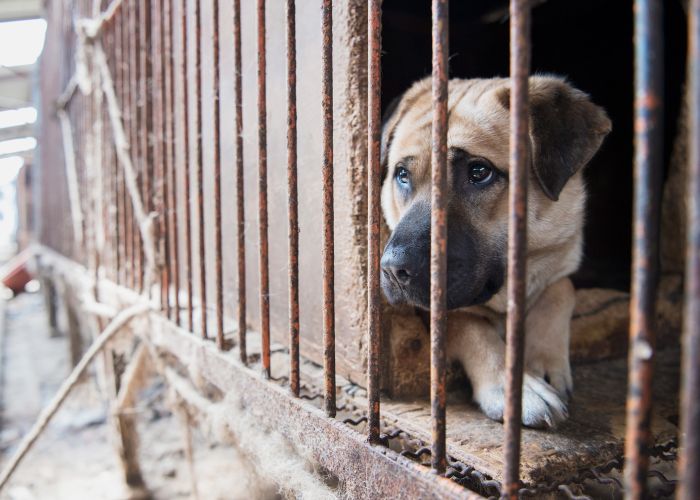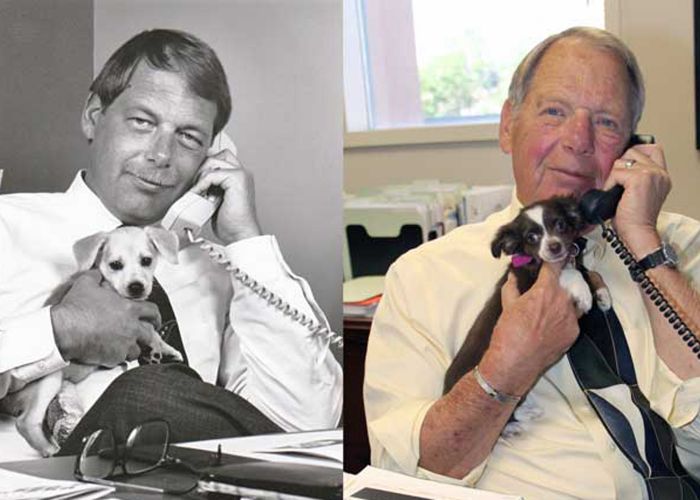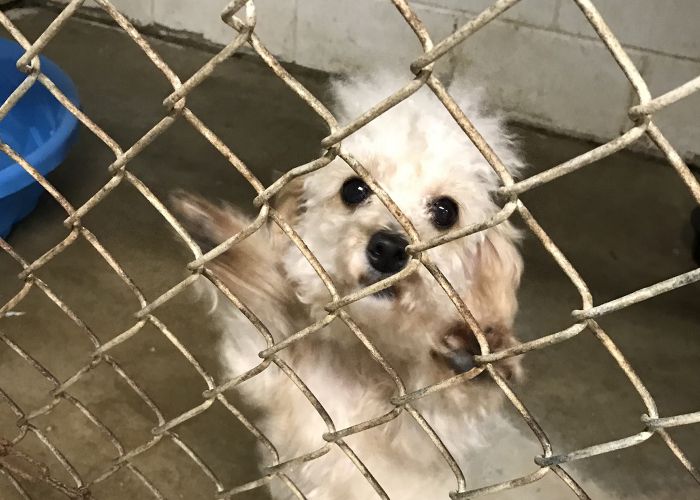Dude, where’s my ear?
Whimsical tales spread compassion for community cats
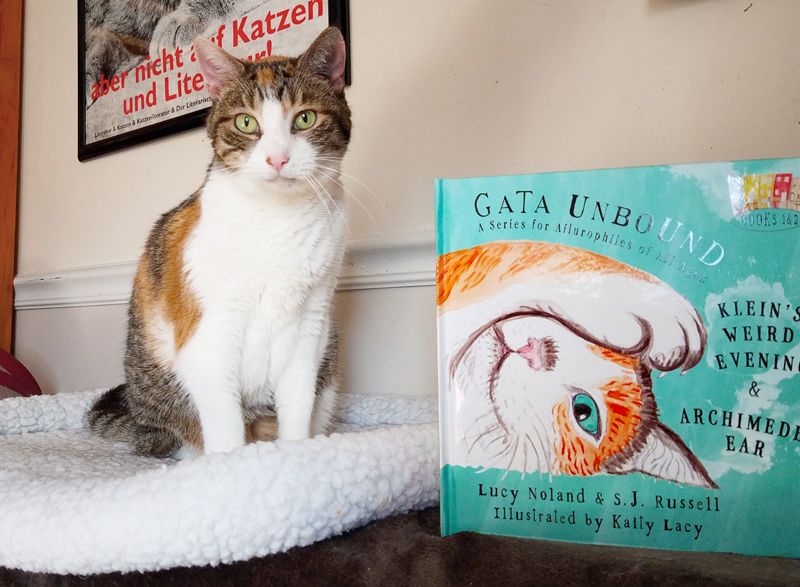
Imagine you're a community cat who’s just been vetted through a trap-neuter-return program.
You’re back in your familiar territory, feeling a bit discombobulated. The last thing you remember clearly was following a path of tuna into a metal box. But that was several days ago.
What just happened? And why are you missing the tip of one ear?
“Klein’s Weird Evening,” the first story in the recently published Gata Unbound book series, follows feline friends Klein and Archimedes in their search for answers—and a prosthetic ear tip. Along the way, Klein reveals his fascination with Mexican freestyle wrestling, while Archimedes writes bad poetry and ponders the failure of some of his most ambitious inventions, including a pasta maker for mice.
If this sounds like a plot dreamed up by a couple of cat lovers after sharing a bottle (or two) of wine, that’s because it is.
Co-authors Lucy Noland and Susan Russell first met when Noland was working as a Fox 29 news anchor and Russell was executive director of ACCT Philly, an open-admission shelter in Philadelphia. A longtime animal advocate, Noland frequently visited the shelter, using her media personality and social network to promote homeless pets.
About a year ago, after both women had left their jobs, they decided to launch a book publishing company that combined their passions for storytelling and saving animals. So they reached out to another friend from the Philly rescue crowd. Kaity Lacy, an artist, humane educator, rescuer and former volunteer at ACCT Philly, agreed to join the venture, which would soon be named Archimedes’ Printing Shoppe & Sundry Goodes.
Since then, the company has released volume 1, containing the first two books of the Gata Unbound children’s series, with volume 2, containing books 3 and 4, due out in December, as well as A**holes Need Love Too, a book for more mature readers that chronicles the adventures of some real-life rescue animals at a New Jersey farm.
In this edited interview with senior editor Julie Falconer, the authors and illustrator of Gata Unbound chat about their inspiration, future goals and the power of a good story.
Why did you choose to focus on TNR in your children’s book series?
Russell: We wanted to be able to do something that was educational but entertaining, and a lot of people don’t quite understand the lifesaving value of TNR. They don’t understand that without TNR, so many animals would be entering open-intake shelters. So the thought was to expand people’s horizons to understand cats as both pets and community cats. We wanted to put out a whimsical series that just opens people’s eyes—
Noland: —and does it slowly. The whole thing is you don’t want to bang them over the head and say, “Look at this: TNR.” They’re just going to walk away. That’s why we do a slow introduction; we’re hoping that people get emotionally invested in a good story and love our characters.
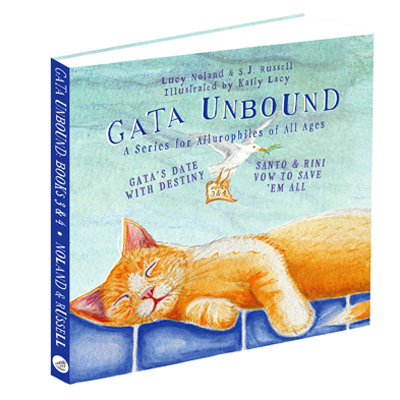
There’s a mystery hook as well, starting with what happened to Klein.
Noland: This kind of goes back to a Gary Larsen comic strip that I saw many, many years ago. It showed fish who were caught and released sitting around in a group therapy session, trying to process what happened. So imagine you’re a cat, you’re out there having fun, wandering around. Something smells great, you get in the trap, and all the sudden, all hell breaks loose.
Later, you’re returned to Earth. It’s like an alien abduction. You talk to other cats and they don’t believe you, but there’s like a small group of you that are like, “No, no, it happened to me too; it’s real.” Later they start to figure out that they’re mysteriously more healthy; they’re living longer lives.
Can you talk about the importance of humane education in raising awareness of community cats?
Lacy: I had developed the curriculum for the humane education program at my local SPCA and was going into classrooms, and it’s just kind of amazing the way these kids immediately connect to animals. They’re interested, and they want to know more. So at this age, you have to encourage that curiosity and their willingness to investigate and then grow empathy from it. That’s what we’re trying to do with these books, and like Lucy says, we’re hoping people fall in love with these characters so much that it becomes a whole movement for caring for animals, including outdoor cats. That’s our big vision for this.
Noland: We hope this will become the basis for an in-school humane education lesson as well as a rip-roaring jaunt through a wild and wonderful world dominated by the feline set. I want to go into schools and teach a course on this: what TNR is, why it’s important, why it’s compassionate and the only way to successfully help outdoor cat populations.
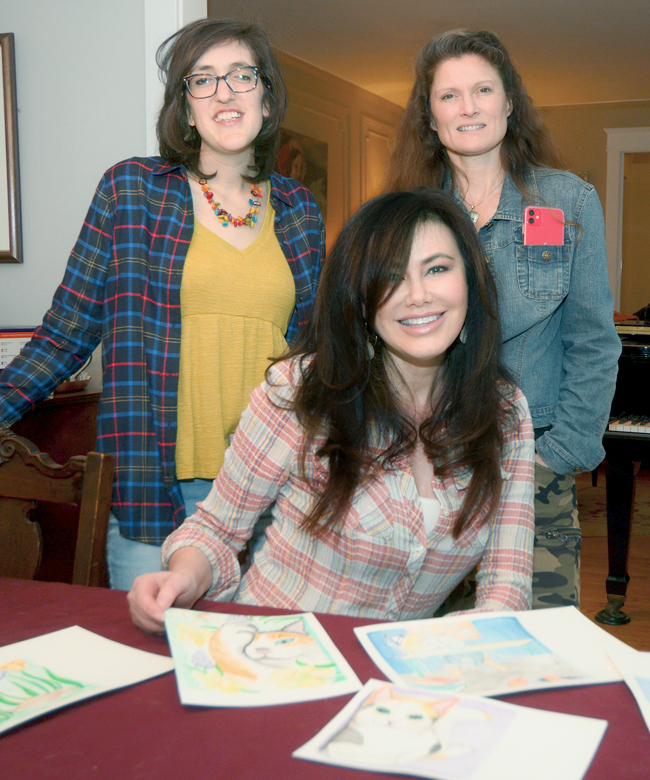
Your human characters have diverse backgrounds, including Vietnamese, Greek and Mexican heritages.
Lacy: I think a really important part of this book is the exposure kids are going to get to different cultures. When illustrating volume 2, I literally spent hours looking at hundreds of photos of Mexican freestyle wrestlers and also the landscape of Santorini [in Greece], where Gata’s mother lives. What kind of sea creatures, what trees, what flowers would be there?
Russell: There’s never been a more important time for recognizing our communities for what they are, which is diverse and richer for their diversity. We want our children’s books to be reflective of that.
What other life lessons do you weave in?
Noland: Klein is very un-cat-like in some ways. He’s all kindness. He was bullied when he was little because he’s a male calico, but he didn’t allow that to tear him down. It made him a more understanding, more compassionate being.
Russell: We weren’t in COVID when we did the first book, but let’s face it, kids have faced a lot of adversity now in their short lives. We want kids to look at it and say, “Hey, I can do this; I can cope. Look at Klein, he’s out meditating with the daffodils.”
Without giving away any spoilers, can you talk about what happens in the rest of the series? Does Archimedes’ lost love Layla return?
Russell: Everybody wants Layla back. Layla will be coming back in volume 3, book 5.
Noland: Can I tell her about Abner the rat?
Russell: No, absolutely not!
What does the future hold for Archimedes’ Printing Shoppe?
Russell: Going forward in 2021, we’re really hoping to become a viable company because we want to give back. During our book launch, we donated $1,000 to sponsor a TNR event in partnership with Philadoptables, Mac’s Fund and Forgotten Cats. We want to be able to do that again. We’re optimistic it will happen.
Noland: We’re really hoping to bring some light into this world and spread compassion and understanding and have some fun while doing it.


